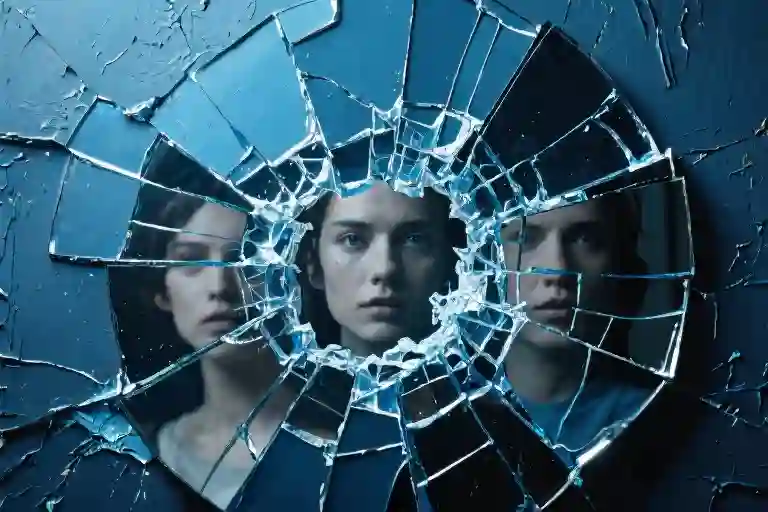The crumpled wedding invitation feels heavy in your hands, its edges digging into your palms like tiny paper knives. Outside your apartment window, the city pulses with indifferent lights while you sit perfectly still, staring at the torn pieces on your coffee table that spell out a future that will never be. There’s a peculiar silence in these moments—the kind where even your breath sounds too loud, where time stretches thin enough to see through to the other side of your pain.
We’ve all had versions of this night. Maybe yours involved a rejection letter instead of a wedding invite, or a doctor’s report instead of a breakup text. The details vary, but the earthquake inside feels the same: that sudden, sickening realization that something you built your whole life around has slipped through your fingers. What do we actually lose when we lose these things? The answer might surprise you.
Heartbreak and growth often wear the same face in the early hours. Right now, all you can feel is the absence—the phantom weight of dreams you’d carried for years suddenly gone. Your mind replays the milestones you’d imagined: walking down that aisle, accepting that job offer, holding that newborn. The colors were so vivid in your daydreams, weren’t they? The textures so real you could almost touch them. That’s why the emptiness now feels like a physical wound.
Somewhere between the third and fourth tear that falls on those torn paper fragments, a dangerous question starts forming: “If I wasn’t meant to have this, then what was all that hoping for?” Be careful with that one. It’s a trap door that leads straight to the dungeon of “I wasn’t good enough”—a place where countless brilliant people have wasted years serving sentences they never deserved.
Here’s what no one tells you about emotional healing after failure: The dreams that dissolve weren’t necessarily false. They just weren’t final. Like scaffolding on a building, some dreams exist to help you climb high enough to see what really belongs to you. Their collapse isn’t punishment—it’s progress disguised as catastrophe.
The city lights outside haven’t changed, but something in the air has. That first raw wave of grief is starting to recede, leaving behind an odd clarity. For the first time in years, your hands are empty. And empty hands, though terrifying, are the only ones that can hold what comes next.
The Sound of Falling
There’s a particular silence that follows loss. Not the peaceful kind you find in empty churches or early mornings, but the heavy, suffocating quiet that settles in your chest when the world keeps moving while yours has stopped. Your hands might still go through the motions — brewing coffee, answering emails, scrolling through feeds — but everything feels like it’s happening through thick glass.
You know this silence. It’s the hollow echo after the last “we need to talk,” the blank space where a job offer should have been, the phantom weight of a future that dissolved overnight. The body reacts before the mind catches up: that metallic taste of adrenaline, the way your skin feels both numb and hypersensitive, the inexplicable exhaustion that has nothing to do with sleep.
I did everything right. The thought circles like a trapped bird. I followed the steps, checked the boxes, showed up early, stayed late. How can it just… not matter?
Anger comes next — at circumstances, at unfairness, at yourself for daring to want something so badly. You replay scenes searching for where it went wrong, as if heartbreak could be reverse-engineered. Nights stretch long with imaginary arguments where you finally say the perfect words that would have changed everything (they wouldn’t have). Mornings arrive too soon, the sunlight feeling like a personal insult.
What no one prepares you for is the self-betrayal in these moments. The way your mind, desperate to make sense of pain, starts listing your inadequacies like evidence: Maybe if I’d been smarter, prettier, more patient, less needy. The brutal arithmetic of heartbreak where you keep dividing yourself into smaller fractions, hoping the sum will somehow explain the unexplainable.
But here’s what that heavy silence won’t tell you yet: This freefall has its own sound. The rushing wind in your ears isn’t just loss — it’s the friction of old ideas about who you’re supposed to be getting stripped away. The ground you think you’re crashing toward? It might just be your own feet finding purchase on something solid for the first time.
Right now, you’re still counting casualties. The future you planned, the identity tied to that dream, the person you believed you’d become. Let the counting happen. Grieve the blueprints. But somewhere beneath the inventory of losses, your hands are already gathering unexpected materials — scraps of resilience you didn’t know you’d saved, unfamiliar strengths that only reveal themselves under pressure.
The landing will come. And when it does, you’ll recognize the most surprising casualty of all: the version of you that thought she couldn’t survive this.
The Illusion of Wanting
We’ve all been there—clutching tightly to a dream that feels as essential as breathing, only to watch it dissolve like mist in sunlight. That promotion you worked 80-hour weeks for. The relationship you poured your soul into. The life path you mapped out at twenty-two with such certainty. When these things slip away, the first question that claws at your insides is always some variation of: If I wanted it this badly, how could it not be mine?
The uncomfortable truth no one mentions when you’re busy building castles in the sky: wanting something intensely doesn’t automatically make it right for you. There’s a fundamental difference between attachment and alignment—one keeps you tethered to an idea, the other actually fits who you’re becoming.
Take Jeremy, a corporate lawyer who came to me clutching his third stress-induced migraine this month. His LinkedIn profile gleamed—Yale Law, partner track at 34—yet his burnout questionnaire showed staggering mismatch scores. “But I’ve wanted this since I saw A Few Good Men at fourteen,” he kept repeating, as if the longevity of his desire proved its validity. We ran a simple exercise: mapping his peak energy moments against daily tasks. The pattern was undeniable—he lit up discussing jury psychology during coffee chats, then flatlined reviewing contracts. His want was really a fourteen-year-old’s cinematic fantasy clinging to an adult’s reality.
This phenomenon isn’t failure; it’s your psyche’s sophisticated filtering system at work. Cognitive scientists call it miswanting—our remarkable human capacity to desire things that won’t actually bring fulfillment. Studies tracking college graduates show 60% pursue careers based on outdated “passion narratives” they constructed before their prefrontal cortex fully developed. The dreams we outgrow don’t disappear—they transform us through their leaving.
Three signs your longing might be out of alignment:
- The Should Chorus (“I should want marriage by now”)
- Effort Addiction (Hustling harder to avoid questioning the goal itself)
- Future-Faking (Only picturing the trophy, never the daily grind)
Here’s what no well-meaning mentor tells you: Some doors close not because you’re unworthy, but because what’s behind them would shrink your soul. That abandoned acting career? It might have saved you from decades of creative starvation. The failed startup? Possibly spared you from becoming someone you’d barely recognize.
When the gap between want and have feels like a personal indictment, try this reframe: What if life isn’t denying you—it’s redirecting you? The same way your phone’s GPS recalculates when you miss a turn, these losses might be course corrections disguised as dead ends. The art lies in distinguishing between giving up too soon (a fear to overcome) and letting go of what no longer fits (a wisdom to cultivate).
Next time you catch yourself staring at a closed door, ask not “Why not me?” but “What did wanting this reveal about who I’m becoming?” The answer might surprise you—not all beautiful things are meant to be kept. Some exist solely to show us the contours of our own evolution.
The Blueprint in the Rubble
There’s a particular kind of clarity that only emerges after the dust settles. When the dream job vanishes, the relationship ends, or the carefully plotted future dissolves, what remains isn’t just emptiness – it’s an unexpected blueprint. The kind you never could have drawn while still clinging to what was.
Tool 1: The Loss Inventory
Start with three blank columns on a page – or three notes on your phone if paper feels too permanent. Label them simply: Things, Connections, Self. This isn’t about cataloging pain, but mapping the actual terrain of your loss with ruthless honesty.
In the Things column, list the tangible: the salary that won’t materialize, the shared apartment you’re leaving, the professional title that’s no longer yours. Seeing them written makes them finite – contained to these lines on paper rather than sprawling endlessly in your mind.
Under Connections, name the relationships that shifted or ended. Not just people, but how you related to them: Friday dinner rituals with colleagues, Sunday phone calls with a partner’s parents, the way your sister would ask for career advice. These are the invisible threads we only notice when they snap.
The Self column often surprises people. Here lie the identities you’ve shed: ‘the reliable provider,’ ‘the creative visionary,’ ‘the patient listener.’ We wear these selves like second skins until suddenly they no longer fit. Writing them down reveals which were costumes and which were genuine layers.
When a client first showed me her completed loss inventory, she stared at it bewildered: “Is it strange that seeing it all listed makes the grief feel… smaller?” That’s the inventory’s magic – it transforms amorphous anguish into something you can hold in your hands, examine, and eventually release.
Tool 2: Letters from the Future
Now take a fresh page and write today’s date at the top. Below it, begin: “Dear Present Me,” then let your future self speak. Not the idealized version who’s ‘over it all,’ but the realistically healed you who understands things your current self can’t yet grasp.
Maybe three months from now you’ll know why that job rejection saved you from toxic culture. Perhaps a year ahead you’ll recognize how the breakup created space for self-discovery. Don’t force insights – imagine your future self gently explaining what seems obvious in hindsight:
“You can’t see it yet, but the confidence you’re building from interviewing elsewhere is exactly what was missing in those negotiations…”
“I know you’re beating yourself up for ‘wasting’ those years, but the emotional intelligence you developed is about to become your greatest asset…”
These letters often reveal their own wisdom. One man wrote about his failed startup, only to discover mid-sentence: “Actually, the coding skills matter less than learning how to rally people – that’s what your next team will need.” His hand had written what his mind hadn’t yet realized.
Keep the letter somewhere accessible. When the loss feels overwhelming, reread it as proof that perspective shifts even when we don’t feel it happening. The words that seem like hopeful fiction today will become lived truth sooner than you expect.
The Scaffolding Beneath
Neither tool promises instant healing. The inventory might initially intensify grief by making losses concrete. The future letter may feel like wishful thinking on dark days. But together they create scaffolding – temporary support while you rebuild something sturdier.
What emerges isn’t the life you planned, but one with unexpected doorways where walls once stood. That client with the loss inventory? She later told me: “Turns out listing what I lost showed me what I’d been ignoring – my knack for teaching. Now I’m training others in my field.”
Your blueprint won’t match anyone else’s. But when you’re ready to look closely at the rubble, you’ll start seeing the outlines of what comes next – not in broad strokes, but in the practical details of mornings and Mondays and meaningful moments. The kind of life that fits who you’re becoming, not who you thought you should be.
The Unexpected Compass
Sarah stared at the cardboard box containing her office belongings—a decade of corporate hustle reduced to a sad cubicle in miniature. The layoff notice still vibrated in her back pocket like a live wire. That night, she found herself painting jagged red strokes across a canvas with her daughter’s acrylics, hands moving with a fury that surprised her. Three months later, her “angry art” collection sold at a local gallery.
What feels like an ending often carries the blueprints for beginnings we couldn’t anticipate. The Japanese art of kintsugi—repairing broken pottery with gold—understands this truth: damage becomes part of an object’s history without diminishing its value. Your fractures too are gathering light in ways you can’t yet see.
Consider the paradox: we discover our true north only after getting lost. That promotion you didn’t get freed up bandwidth for the side project that became your calling. The relationship that ended created emotional space for self-discovery. Like trees forced sideways by wind that develop extraordinary root systems, our apparent detours often anchor us more deeply.
Try this tonight: List three things your “failure” made possible. Maybe losing that job meant finally having time to volunteer at the animal shelter where you met your now-best friend. Perhaps the rejected manuscript forced you to rewrite it into something far more authentic. Watch how the story changes when you focus not on what was taken, but on what was revealed.
Your turn now—what invisible gift is your loss slowly unwrapping?
When the Wave Takes Your Board
You’re floating in saltwater, hands still gripping the phantom shape of what was supposed to keep you afloat. The current stings your eyes as you search for that familiar outline against the glare—the career, the relationship, the version of yourself you’d painstakingly carved into existence. Gone. Not even a ripple marks where it disappeared.
This is the moment we never prepare for: when the ocean shrugs and swallows what we thought was ours to keep. The shock tastes metallic, like blood from a bitten cheek. Your muscles remember the weight that’s no longer there, arms still curved around empty space. Instinct screams to chase after it, but the horizon line stretches undisturbed in all directions.
Here’s what the surfing manuals don’t tell you: sometimes the board snaps not because you failed to balance, but because you were meant for deeper waters. That sickening crack? That’s the sound of your capacity expanding. The riptide dragging you under? That’s the universe insisting you learn to swim without floatation devices.
Three months from now, you’ll trace the scar where the fin grazed your thigh and laugh at how small the wound seems. Six months out, you’ll realize the current was pushing you toward an uncharted cove where the waves break cleaner. By next year, you might even thank the shark that chewed through your tether.
Tonight, salt still crusting your lashes, try this:
- List three things the ocean took (write them in disappearing ink)
- List three things it left in your pockets (sand dollars, sea glass, unexpected strength)
- Ask the night sky: What vessel is being built for me while I tread water?
Some losses aren’t endings but nautical charts scratched onto your bones—invisible until you hold them up to the right light.





